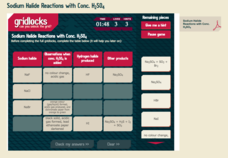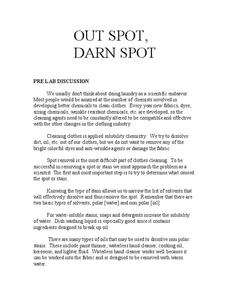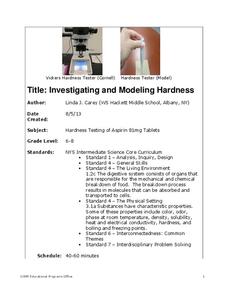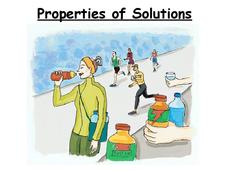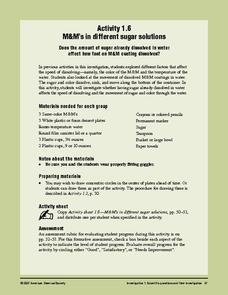Chemistry Collective
Virtual Lab: Temperature and the Solubility of Salts
Can your scholars solve the mystery of why salts dissolve? A virtual workbench allows them to experiment with temperature and solubility with no solution prep and no post-lab clean up! Users determine the solubility of a variety of...
Royal Society of Chemistry
Lead Compounds: Precipitation Reactions and Pigments—Microscale Chemistry
Colorful lead compounds never fail to impress! Solubility scholars examine a series of double replacement reactions involving lead nitrate and record their observations. The second part of the experiment illustrates the differences...
Royal Society of Chemistry
Chemistry Masterclass—Chemistry Outreach
Immerse your chemistry class in the world of organic chemistry! Science scholars isolate acetaminophen from an over-the-counter sample during an intense and interesting lab. Groups use many different separation and analysis techniques to...
Royal Society of Chemistry
Sodium Halide Reactions with Conc. H2SO4
What do you get when you combine precipitate reactions with puzzles? Maximize the engagement in a single replacement reactions lesson by incorporating fun puzzles. Chemistry scholars observe the reaction between several sodium halides...
Serendip
Out Spot, Darn Spot
Encourage your classes to be laundry helpers! Learners explore the chemistry of stain removal with a lab investigation. By identifying the components of the stain, they identify the most effective solute for its removal.
Royal Society of Chemistry
Some Reactions of Carbon Dioxide—Microscale Chemistry
Precipitation reactions are always interesting. How about one that forms a precipitate using a gas? Chemists of any age will enjoy this twist on a standard solubility lab. Partners observe the lack of interaction between sodium hydroxide...
Cornell University
Investigating and Modeling Hardness
Model hardness testing with a self-designed hardness test. Young scholars rate the hardness of different types of aspirin using the Vicker's Hardness scale. They then relate hardness to the solubility of each aspirin tablet.
Beyond Benign
Packed Up Properties
Determine physical properties of potential packaging materials. Continuing from previous lessons in the series, the resource asks groups to identify physical properties of the substances. They test for conductivity, solubility, water...
Concord Consortium
Oil and Water
If you don't get along with someone, it's said that the two of you are like oil and water. Why is this? Explore the phenomenon and explain the phrase in one resource! Science superstars first observe samples of oil and water together....
Fuse School
Quiz: Emulsions
Ready to mix it up? Learners step up to the plate and show what they know in the 12th installment of a 14-part series covering the states of matter. The quiz contains four questions testing the basics of emulsion chemistry.
NOAA
Where There's Smoke, There's ...
A remotely operated vehicle approaching a volcano was engulfed by molten sulfur where the plumes of fluids contained the highest concentrations of aluminum ever recorded. This isn't science fiction or an April fools joke, though it did...
Fuse School
Quiz: Diffusion and Solubility Curves
Quiz time! Part eight in a 14-part series about solids, liquids, and gases provides an opportunity to assess individual's learning. The interactive quiz covers the topics of solubility, solubility curves, and diffusion.
Chymist
Determination of the Volume of CO2 in Pop Rocks
Where does the pop in pop rocks come from? An engaging activity asks scholars to measure the amount of carbon dioxide in a package of Pop Rocks candy. Learners dissolve the candy in water and use the solubility of CO2 to determine its mass.
Science Geek
Properties of Solutions
Study the properties of solutions as they relate to mixtures. The slide show presents the key concepts involved with solutions including solvents, solutes, solubility, and electrolytes. Scholars learn the basics of the properties of...
American Chemical Society
Using Dissolving to Identify an Unknown
There is a solvent called aqua regis that can dissolve gold! After observing a solubility demonstration, groups receive four known crystals and one unknown. Based on the demo, they design an experiment to determine the identity of the...
Teach Engineering
Chromatography Lab
Groups use alcohol and chromatography paper to separate the color components of black ink. The purpose of the activity is to allow the class to become aware that mixtures exist in hidden places.
Olomana School
Mixtures and Solutions: Paper Chromatography Experiment
Why does some ink bleed through paper, and other ink doesn't? Practice some paper chromatography to separate the colors from a pen with an interactive experiment for middle and high schoolers. Learners use a variety of solutions to track...
Chymist
The Solubility of a Salt in Water at Various Temperatures
An educational activity allows young chemists to test the solubility of different types of salt at various temperatures. Groups create a graph using data from unsaturated, saturated, and supersaturated solutions.
Science Friday
Capturing Carbon Dioxide
Why don't we just capture carbon dioxide in the air and store it somewhere else? A hands-on lesson allows scholars to explore a complex concept. First, they will create a carbonated beverage, and then they will determine if liquid...
American Chemical Society
M&M's in Different Sugar Solutions
To conclude a mini unit on the dissolving of M&Ms® candy coating, this activity investigates whether or not the concentration of sugar in the solvent affects the dissolving rate. Consider having older science learners write their own...
Curated OER
Chapter 13 Review, Mixed Review: Ions in Aqueous Solutions and Colligative Properties
Here is an attractive worksheet that walks chemistry learners through a review of aqueous solutions. There are matching, short answer, and multiple choice questions dealing with boiling and freezing points, precipitate, molality, net...
Curated OER
Chapter 12 Review, Section 3: Solutions
A neat presentation and challenging content make this solutions learning exercise an ideal homework assignment for your budding chemists. Short answer and problem solving questions get them to review molarity, products, and reactants.
Curated OER
Organic Chemistry 231, Martin Larter, Exam 1
If you need a straightforward and comprehensive organic chemistry exam, check this one out. Chemistry pupils identify functional groups in molecule diagrams, draw a Lewis structure, fill in a table about molecular shape, predict boiling...
Curated OER
Practice Final
A full-fledged practice final prepares pupils for their general chemistry final exam. If they complete these 57 multiple-choice questions correctly, they will be well-prepared. Note: even though the questions are multiple-choice, there...





